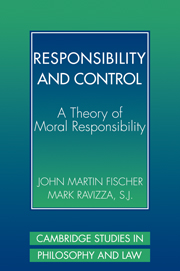Book contents
- Frontmatter
- Contents
- Acknowledgments
- 1 Moral Responsibility: The Concept and the Challenges
- 2 Moral Responsibility for Actions: Weak Reasons-Responsiveness
- 3 Moral Responsibility for Actions: Moderate Reasons-Responsiveness
- 4 Responsibility for Consequences
- 5 Responsibility for Omissions
- 6 The Direct Argument for Incompatibilism
- 7 Responsibility and History
- 8 Taking Responsibility
- 9 Conclusion
- Bibliography
- Index
4 - Responsibility for Consequences
Published online by Cambridge University Press: 05 June 2012
- Frontmatter
- Contents
- Acknowledgments
- 1 Moral Responsibility: The Concept and the Challenges
- 2 Moral Responsibility for Actions: Weak Reasons-Responsiveness
- 3 Moral Responsibility for Actions: Moderate Reasons-Responsiveness
- 4 Responsibility for Consequences
- 5 Responsibility for Omissions
- 6 The Direct Argument for Incompatibilism
- 7 Responsibility and History
- 8 Taking Responsibility
- 9 Conclusion
- Bibliography
- Index
Summary
INTRODUCTION
We have argued that an agent can legitimately be held morally responsible for an action, even though he could not have done anything else. Further, we have suggested that the basis of such responsibility, when it exists, is that the agent has guidance control of his action. Finally, we have claimed that an agent has guidance control of his action insofar as it issues from his own, moderately reasons-responsive mechanism.
Individuals are held morally responsible for various things in addition to actions. In this chapter we shall consider moral responsibility for the consequences of what one does. And in the following chapter, we shall discuss moral responsibility for omissions. We thus wish to go some distance toward giving a comprehensive account of moral responsibility. Our accounts of moral responsibility for consequences and omissions will build on the account of moral responsibility for actions.
As a clear example of our interest in evaluating moral responsibility for consequences, consider the case of the Exxon Valdeez. The captain was (presumably) morally responsible for the way he steered his ship, and thus for his actions. But we are not just (or even primarily) interested in his actions; we are very much interested in fixing moral responsibility for the consequence – the huge, damaging, and costly oil slick.
- Type
- Chapter
- Information
- Responsibility and ControlA Theory of Moral Responsibility, pp. 92 - 122Publisher: Cambridge University PressPrint publication year: 1998

